![]()
![]()
![]()
Adder Class Submarine Torpedo Boat: Laid down as Porpoise, 13 December 1900, at Crescent Shipyard, Elizabethport, NJ; Launched, 23 September 1901; Commissioned USS Porpoise, 19 September 1903, at the Holland yard, New Suffolk, NY; Decommissioned, 21 April 1907, at New York Navy Yard; Recommissioned, 20 November 1908, at Cavite Navy Yard, PI; Renamed USS A-6, 17 November 1911; Decommissioned, 12 December 1919; Designated (SS-7), 17 July 1920; Final Disposition, authorized as a target in July 1921; Struck from the Naval Register, 16 January 1922. Specifications: Displacement; Surfaced, 107 t., Submerged, 123 t.; Length 63' 10"; Beam 11' 11"; Draft 10' 7"; Speed, Surfaced, 8 kts, Submerged, 7 kts; Depth Limit 150'; Complement, 1 Officer, 6 Enlisted; Armament, one 18" torpedo tube, 5 torpedoes; Propulsion, Otto Gas Engine Works gasoline engine, HP 160; Fuel Capacity 767 gal.; Electro Dynamic electric motors, HP 150; Battery Cells 60; single screw.
| Click On Image For Full Size | Size | Image Description | Source | |
|---|---|---|---|---|
 | NR | LAUNCHING OF THE PORPOISE (SS-7) AT THE CRESCENT SHIPYARD. TORPEDO BOATS LAUNCHED. GREAT CROWDS WITNESS THE NICHOLSON AND THE PORPOISE AS THEY GLIDE INTO THE WATER. The double launching at the Crescent shipyard here this afternoon of the torpedo boat Nicholson and the submarine torpedo boat Porpoise was entirely successful. There was a great tooting of whistles from the various steam craft in the neighborhood, and also from the factories along the shore, while the New York police boat Patrol discharged her cannon as each destroyer plunged into what was in the future to be its natural element. There were thirteen men on the deck of the Porpoise when she took her dip, and double that number on the Nicholson. The latter carried three large American flags, while the companion vessel had one big American flag, together with the blue ensign of the Crescent shipyard. A large party came from New-York on the steam yacht Giralda to witness the launching, while the christening party came on Lieutenant Nixon's houseboat Loudoun. The Nicholson was christened by Mrs.Oliver H. P. Belmont, who was dressed in a black and white foulaid silk, trimmed with cherry. Miss Jessie Campbell Moore, of Brooklyn, was sponsor for the Porpoise. Miss Moore was gowned in a light costume. | Image and text provided by Library of Congress, Washington, DC. Photo from New-York Tribune.(New York [N.Y.]) 1866-1924, 24 September 1901, Image 7, via chroniclingamerica.loc.gov. |
|
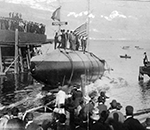 | 349k | Porpoise (SS-7) launched on 23 September 1901, at Elizabethport, New Jersey. | Photograph # Lot-3774-4 courtesy of the Library of Congress via National Museum of the U.S. Navy & flickr.com. | |
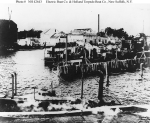 | 129k | Electric Boat Company/Holland Torpedo Boat Company facility, New Suffolk, Long Island, New York. Photographed circa 1902, with two torpedo boats tied up to the breakwater and Porpoise (SS-7) in the foreground. | USNHC photograph # NH 42643. | |
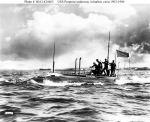 | 107k | Porpoise (SS-7) underway in harbor, circa 1903-1906. Note the officer steering the submarine, and the 13-star "boat" ensign she is flying. | USNHC photograph # 80-G-424463. | |
 | 80k | Off New York Navy Yard, Porpoise (SS-7) displays her enlarged conning tower and tall periscope (its lens points dead ahead). The other two pipes are a ventilator and the diesel induction. Note how the deck has been extended outboard around the enlarged conning tower. The purpose of the object on the bow is unknown. | Photo & text courtesy of U.S. Submarines Through 1945, An Illustrated Design History by Norman Friedman. Naval Institute Press. | |
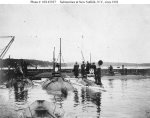 |
107k | Moccasin (SS-5) Electric Boat Company/Holland Torpedo Boat Company facility, New Suffolk, Long Island, New York. Submarines in the facility basin, circa 1903. Boats in the front group are (from left to right): Plunger (SS-2); Porpoise (SS-7); and Adder (SS-3). In the background, by the breakwater are (left-right): Shark (SS-8) and Moccasin (SS-5). Photographed by Legendre & Levick, New York. |
USNHC photograph # NH 45937. | |
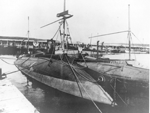 | 327k | Circa 1903-04 photo of the Porpoise (SS-7) inboard and the never commissioned Fulton outboard, along with a number of other submarines in the background. The Fulton was shipped to Russia in June of 1904 aboard the English freighter Menantic bound for St. Petersburg and then ended up via rail in Vladivostok. | Text i.d. courtesy of Ric Hedman. USN photo courtesy of Scott Koen & ussnewyork.com. | |
 | 514k | Tank layout of the Adder class submarine by Bureau of Construction and Repair, Navy Department August 1904. | USN photo courtesy of Darryl L. Baker. | |
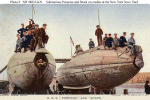 | 138k | Shark (SS-8) at left, and Porpoise (SS-7) on cradles at the New York Navy Yard, circa 1905. Photograph by Enrique Muller, published on a contemporary postal card by the American Colortype Company. | USNHC photograph # NH 98835-KN courtesy of the Naval Historical Foundation. Collection of Commander Theodore G. Ellyson, USN. | |
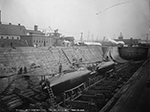 | 564k | 2 views of Shark (SS-8) and Porpoise (SS-7) behind her in Dry Dock Number 1, Brooklyn Navy Yard, 23 March 1905. | National Archives Identifier: 6880340 & 6880343 Agency-Assigned Identifier: F1021 N1 & insert F1040. Photo courtesy of catalog.archives.gov | |
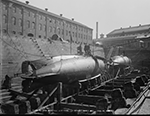 | 566k | Porpoise (SS-7) and in front of her is Shark (SS-8) in Dry Dock Number 1 at Brooklyn Navy Yard, 23 March 1905. | National Archives Identifier: 6880353 Agency-Assigned Identifier: F1022 N1. Photo courtesy of catalog.archives.gov | |
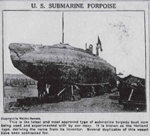 | 652k | U S SUBMARINE PORPOISE (SS-7) This is the latest and most approved type of submarine torpedo boat now being used and experimented with by our navy. It is known as the Holland type deriving the name from its inventor. Several duplicates of this vessel have been contracted for. | Image and text provided by University of Utah, Marriott Library. Photo from The Spanish Fork Press. (Spanish Fork, Utah) 1902-current, 06 February 1908, Image 3, via chroniclingamerica.loc.gov. |
|
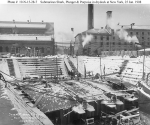 | 145k | New York Navy Yard, Brooklyn, New York: Submarines Shark (SS-8), Plunger (SS-2 ) and Porpoise (SS-7) housed over and covered with snow, in one of the Navy Yard's drydocks, 25 January 1908. | USNHC photograph # NH 19-N-15-28-7. Courtesy Commander Donald J. Robinson, USN (Retired), 1977. | |
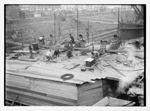 0800709 |
1.42k | New York Navy Yard, Brooklyn, New York: Submarines Shark (SS-8), Plunger (SS-2 ) and Porpoise (SS-7) housed over and covered with snow, in one of the Navy Yard's drydocks, 25 January 1908. | Photo i.d. via Ric Hednan . Photo courtesy of loc.gov, courtesy of the George Grantham Bain Collection. Reproduction Number LC-DIG-ggbain-00108. | |
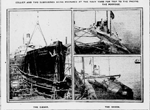 | 1.01k | COLLIER AND TWO SUBMARINES BEING PREPARED AT THE NAVY YARD FOR TRIP TO THE PACIFIC. SUBMARINES FOR PACIFIC The Collier Caesar (AC-16) Will Carry Two of Them on Long Trip. | Image and text provided by Library of Congress, Washington, DC. Photo from New-York Tribune. (New York [N.Y.]) 1866-1924, 15 March 1908, Image 58, via chroniclingamerica.loc.gov. |
|
 | 697k | Loaded on board the collier Caesar (AC-16), Shark (SS-8) and her sistership, Porpoise (SS-7), comprised the auxiliary's deck cargo as she proceeded, via Suez, for the Philippine Islands. Photo taken at the New York Navy Yard in April 1908. | Text courtesy of DANFS. USN photo thanks to Jim Kurrasch @ Battleship Iowa, Pacific Battleship Center. | |
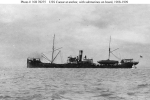 | 81k | Caesar (AC-16) at anchor in 1908-1909, while transporting submarines to the Philippine Islands. The "boats" are either Submarines Shark (SS-8), and Porpoise (SS-7) which were embarked on Caesar (AC-16) in April-July 1908, or Adder (SS-03) and Moccasin (SS-5), which were on board in July-October 1909. | USNHC photograph # NH 78275. | |
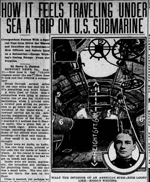 | 1.32k | HOW IT FEELS TRAVELING UNDERSEA - A TRIP ON U.S. SUBMARINE WHAT THE INTERIOR OF AN AMERICAN SUBMARINE LOOKS LIKE — ENSIGN WHITING. In April 1909, Ens. Kenneth Whiting, a future naval aviation pioneer, became Porpoise's (SS-7) commanding officer. On 15 April, Whiting and his crew of six took the submarine out for what was to be a routine run. Porpoise got underway, cleared the dock and moved out into Manila Bay. She dove soon thereafter, and leveled off at a depth of 20 feet. Only then did Whiting, with contagious confidence, reveal his intentions. Convinced that a man could escape from a submarine through the torpedo tube, Whiting determined that he was going to try and test his theory with himself as a guinea pig. Squeezing into the 18-inch diameter tube, he clung to the crossbar which stiffened the outer torpedo tube door, as the crew closed the inner door. When the outer door was opened and water rushed in Whiting hung onto the crossbar that drew his elbows out of the tube's mouth, and then muscled his way out using his hands and arms, the entire evolution consuming 77 seconds. He then swam to the surface, Porpoise surfacing soon thereafter. Reticent to speak about the incident in public, he nevertheless informed his flotilla commander, Lt. Guy W. S. Castle, who submitted a report on how the feat had been accomplished. In Porpoise's log that day, Whiting had simply commented: "Whiting went through the torpedo tube, boat lying in (the) water in (a) normal condition, as an experiment ...." | Text from DANFS. Image and text provided by Washington State Library; Olympia, WA. Photo from The Tacoma Times.(Tacoma, Wash.) 1903-1949, 21 August 1909, Image 8, via chroniclingamerica.loc.gov. |
|
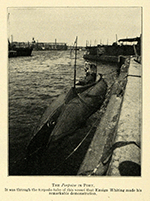 | 331k | THE PORPOISE (SS-7) IN PORT It was through the torpedo tube of this vessel that Ensign Whiting made his remarkable demonstration. Original 1910 halftone print of the Porpoise. | Photo courtesy of periodpaper.com | |
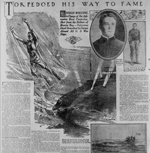 | 1.06k | TORPEDOED HIS WAY TO FAME ENSIGN WHITING in Charge of the Submarine Boat Porpoise (SS-7), Shot From the Bottom of Manila Bay - Valorous Deed Described to Crews Aboard All U.S. Warships. | Image and text provided by University of California, Riverside. Photo from The San Francisco Call.(San Francisco [Calif.]) 1895-1913, 29 August 1909, Image 2, via chroniclingamerica.loc.gov. |
|
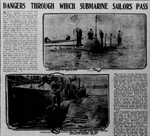 | 607k | DANGERS THROUGH WHICH SUBMARINE SAILORS PASS PLUNGER (SS-2 ) ABOUT TO TAKE A DIVE SUBMARINE BOAT PORPOISE (SS-7) ALONGSIDE A TORPEDO BOAT, DEMONSTRATING THE TINY NATURE OF FORMER CRAFT. | Image and text provided by University of California, Riverside. Photo from The San Francisco Call.(San Francisco [Calif.]) 1895-1913, 09 October 1910, Image 3, via chroniclingamerica.loc.gov. |
|
 | 110k | Adder (SS-03) at the Cavite Navy Yard, Philippine Islands, circa 1910-1911. Porpoise (SS-7) is in the left background.Note the man inside Adder's cowl ventilator. | USNHC photograph # NH 90169. | |
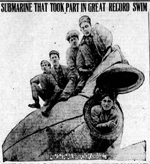 |
528k | SUBMARINE THAT TOOK PART IN GREAT RECORD SWIM | Photo i.d. courtesy of David Johnston Image and text provided by University of Hawaii at Manoa; Honolulu, HI. Photo from Evening Bulletin. (Honolulu [Oahu, Hawaii) 1895-1912, 22 July 1911, 3:30 EDITION, Image 17, via chroniclingamerica.loc.gov. | |
 | 79k | A-6 (SS-7) at the Cavite Navy Yard, Philippines, circa 1912. A Bainbridge class destroyer is in the background. | USNHC photograph # NH 98836. | |
 |
83k | A-6 (SS-7) underway in Manila Bay, Philippine Islands, circa 1912. A-4 (SS-5) and a Bainbridge class destroyer are in the background. | USNHC photograph # NH 90187. | |
 |
122k | Dewey Drydock, Olongapo Naval Station, Philippines.
Submarines A-6 (SS-7), A-4 (SS-5), and A-2 (SS-3) in the Dewey Drydock, circa 1912.
The boats show standard features: a single tall periscope abaft the conning tower; a conning tower fairing; and a bridge structure atop the conning tower, with the surface wheel atop it. This photo was taken before the boats had been fitted with forward periscopes. The bow of their tender, Mohican, is at left, with an anchor suspended from her starboard cathead. |
Photo # NH 90185 courtesy of U.S. Naval Historical Center. Partial text courtesy of U.S. Submarines Through 1945, An Illustrated Design History by Norman Friedman. Naval Institute Press. | |
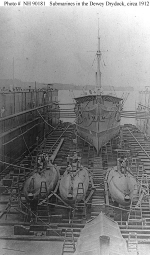 |
87k | Submarines and their tender, Mohican, in the drydock, circa 1912. The submarines are (from left to right): A-6 (SS-7), A-4 (SS-5) and A-2 (SS-03). | USNHC photograph # NH 90181. | |
 | 186k | Winds whip the flags of A-6 (SS-7) & A-7 (SS-8) at Cavite. | Photo courtesy of Frederick J. Moisson, Collection Manager & Volunteer Coordinator, Museum of Military History, 5210 West Irlo Bronson Memorial Highway, Kissimmee, Florida 34746. | |
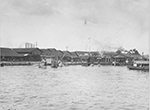 |
455k | Submarine base at Cavite. Manila, Philippine Islands. It looks as if all 4 boats appear in this circa 1917 photo. |
Photographer: Committee on Public Information National Archives Identifier: 45511423 Local Identifier: 165-WW-328E-5 Photo courtesy of catalog.archives.gov |
|
View the Porpoise / A-6 (SS-7)
DANFS history entry located on the Haze Gray & Underway Web Site.
Crew Contact And Reunion Information
Not Applicable to this Vessel
Additional Resources and Web Sites of Interest
PigBoats.COM TM, a Historic Look at Submarines
| Back To The Main Photo Index | Back To the Submarine Index |
| Problems and site related matters, E-mail Webmaster |
| This page is created by Gary Priolo, and maintained by Michael MohlAll Pages © 1996 - 2025 NavSource History. All rights reserved. |